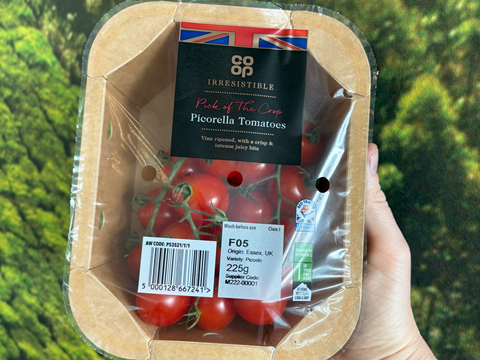
By adopting a bag-in-box mini bite bakery format, solid board tomato punnets, and fibre-based composite packaging for its steak cuts, Co-op plans to remove 115 tonnes of plastics from its own-brand ranges every year.
In what it describes as an ‘industry-first move’, Co-op is transitioning its new mini bite bakery ranges from conventional plastic tubs to a bag-in-box format. Apparently, this will reduce its plastic usage by 87% and save 18 tonnes of plastic every year.
Switching its own-brand premium tomato lines from plastic punnets to two variants of solid board punnets is also expected to save 77 tonnes of plastic every year. Additionally, its Irresistible British steak range of three premium cuts will now be distributed in a fibre-based composite pack – a move set to avoid 20 tonnes of plastic.
According to Co-op, these redesigns will contribute to a total of 5,000 tonnes of plastic removed from its own-brand packaging since 2018. In 2024, the retailer claims to have saved over 420 tonnes of plastic through packaging redesigns, from implementing banana bands across its banana lines to removing plastic lids from its houmous pots.
As well as saving plastic, the new packaging is kerbside recyclable in the paper stream, so it is expected to streamline home recycling for consumers.
“Co-op is committed to making a difference to the lives of our members and the world in which they live,” said Heather Thomas, group property and sustainability director at Co-op. “These new packaging developments will have a substantial impact across our operations, eliminating millions of pieces of plastic and importantly simplifying home recycling for our members and customers.
“The past year has continued to bring ongoing climate and environment crises in the UK and beyond, and we all must do more - Co-op is focused on working with suppliers and, within its own operations, to continue to reduce its plastic and carbon footprint.”
Co-op also claims to have implemented recycling units for soft plastics into 2,300 of its retail stores. It also aspires to reach net zero across its operations by 2035 and across its entire business by 2040.
Among similar retailer initiatives is the decision by Sainsbury’s to repackage its own-brand twin avocados in kerbside recyclable paper with bamboo netting. The move is anticipated to save 20.2 million pieces of plastic every year.
Meanwhile, Greggs, Asda, Lidl, M&S, Tesco, Waitrose and Morrisons have adopted Greiner Packaging’s self-separating packaging solution for their own-brand instant porridge pots. The pot is believed to achieve a recyclability rate of up to 98% as the cardboard wrap separates from the plastic pot during the disposal process, avoiding reliance on the consumer manually separating each component.
If you liked this story, you might also enjoy:
The ultimate guide to the Packaging and Packaging Waste Regulation in 2025
How are the top brands progressing on packaging sustainability?
Everything you need to know about global packaging sustainability regulation in 2025
The key to increasing the use of reusable packaging in supermarkets














No comments yet